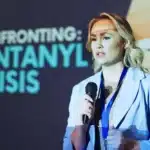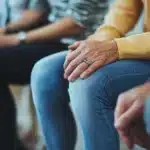Why Family Involvement Is Crucial in Addiction Recovery
Addiction recovery in New Jersey is not an isolated journey. While treatment begins with the individual, family members also play a powerful role in the healing process. Parents, partners, siblings, and even extended relatives influence outcomes by providing encouragement, setting boundaries, and rebuilding trust.
At Rolling Hills Recovery Center in Chester, NJ, our programs are designed to support both individuals and their families, because long-term recovery is strongest when loved ones are engaged in the process.
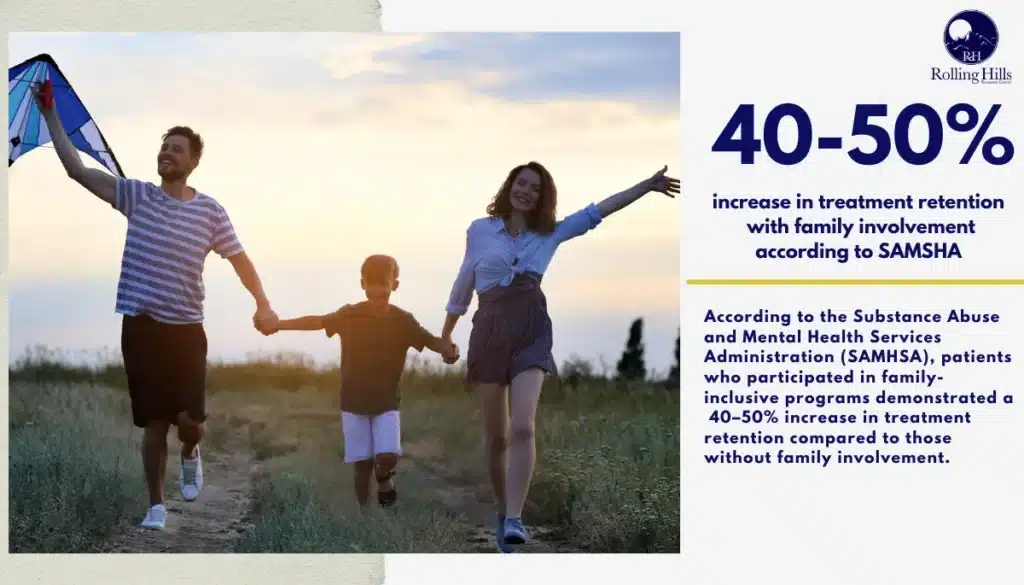
Research-Backed Benefits of Family Participation in NJ Rehab Recovery
Codependency, Role Reversal, and Enabling
- According to the Substance Abuse and Mental Health Services Administration (SAMHSA), patients who participated in family-inclusive programs demonstrated a 40–50% increase in treatment retention compared to those without family involvement.
- A National Institute on Drug Abuse (NIDA) study found that families who engaged in structured therapy had lower relapse rates within the first 12 months of recovery.
- In New Jersey, the Department of Human Services reported that programs offering family support saw 25% higher satisfaction scores among clients.
Why it matters: Longer retention, lower relapse rates, and higher satisfaction all indicate that family engagement is one of the most effective recovery supports.
Tools That Help Families Support Recovery
- Research from the National Institute on Drug Abuse (NIDA) and SAMHSA shows that families engaged in treatment have lower relapse rates and improve long-term recovery.
- Programs such as Family Therapy for Addiction Treatment and licensed counseling sessions at Rolling Hills Recovery Center guide families in setting boundaries, reducing codependency, and improving communication.
- When substance use disorders overlap with conditions like depression or anxiety, Dual Diagnosis Treatment is more effective when family members understand how mental health impacts recovery.
- Approaches like Cognitive Behavioral Therapy (CBT) and Dialectical Behavior Therapy (DBT) teach relatives practical coping skills that reduce relapse risk and improve household dynamics.
- Families in New Jersey benefit from support networks such as Al-Anon Family Groups, Nar-Anon Family Groups, the Mental Health Association in NJ, and statewide services like NJ 211.
- Recovery doesn’t end after treatment. The Alumni Program helps families and individuals stay connected, attend recovery events, and maintain accountability in the months and years after rehab.
Families across Morris County, Somerset, Hunterdon, and nearby communities have access to treatment and resources through Rolling Hills Recovery Center and New Jersey’s Department of Human Services.
How Addiction Affects Families
Common Family Challenges During Addiction
When one person struggles with drugs or alcohol, the entire family system is disrupted. Common relationship challenges brought on by addiction often include:
- Breakdown of trust between partners, family, or friends
- Increased conflict and communication struggles
- Financial strain and instability
- Emotional distance or withdrawal
- Enabling behaviors or unhealthy codependency
- Strained relationship dynamics
Counselors at Rolling Hills Recovery Center often see that…
- Partners struggle with relational trust erosion, where past secrecy around substance use makes rebuilding honesty a long-term process.
- Families experience communication breakdowns and what therapists call attachment strain, where emotional bonds feel distant or uncertain.
- Loved ones fall into patterns of codependency, taking on unhealthy caretaking roles or enabling behaviors without realizing it.
- Many parents describe role reversal, where children take on adult responsibilities due to addiction in the household.
- Siblings frequently encounter conflict escalation, as anger and resentment build from years of instability.
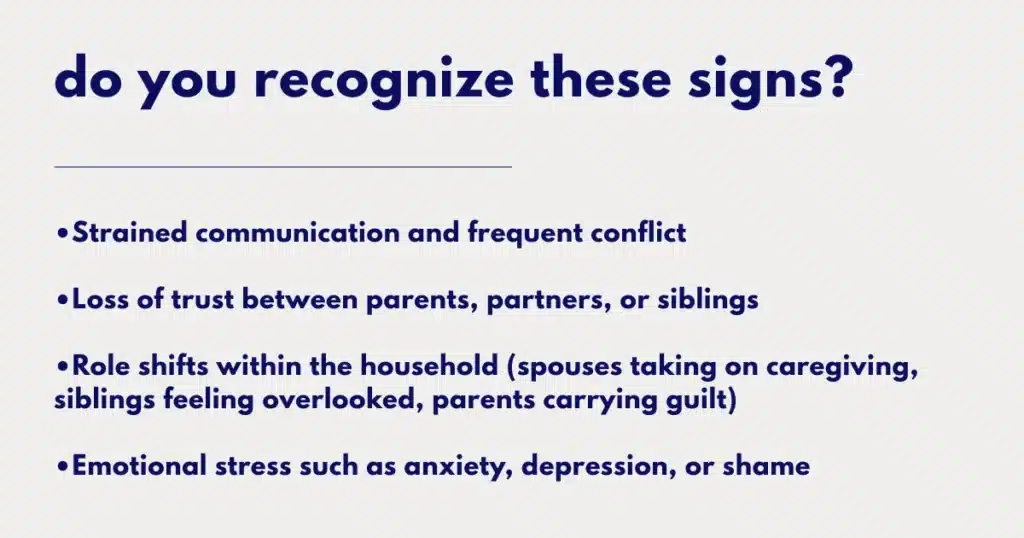
Recognizing these challenges allows NJ rehab programs to provide integrated care that addresses not just the individual but the family as a whole.
Why Family Involvement Strengthens Rehab Outcomes
Research from the National Institute on Drug Abuse (NIDA) shows that treatment outcomes improve when families are involved. Therapy sessions and educational workshops give relatives practical tools to:
- Support sobriety without enabling
- Establish healthy boundaries
- Manage their own stress and emotional needs
- Reduce the risk of relapse through accountability
Family involvement is also critical in programs like Dual Diagnosis Treatment, where addiction intersects with mental health conditions such as depression or anxiety.
In Morris County, family-focused support networks such as Recovery Court, Mental Health Association in NJ, and NJ 211 complement treatment at Rolling Hills Recovery Center in Chester.
Family Integration in NJ Rehab Programs
Resources Available in NJ and Nationwide
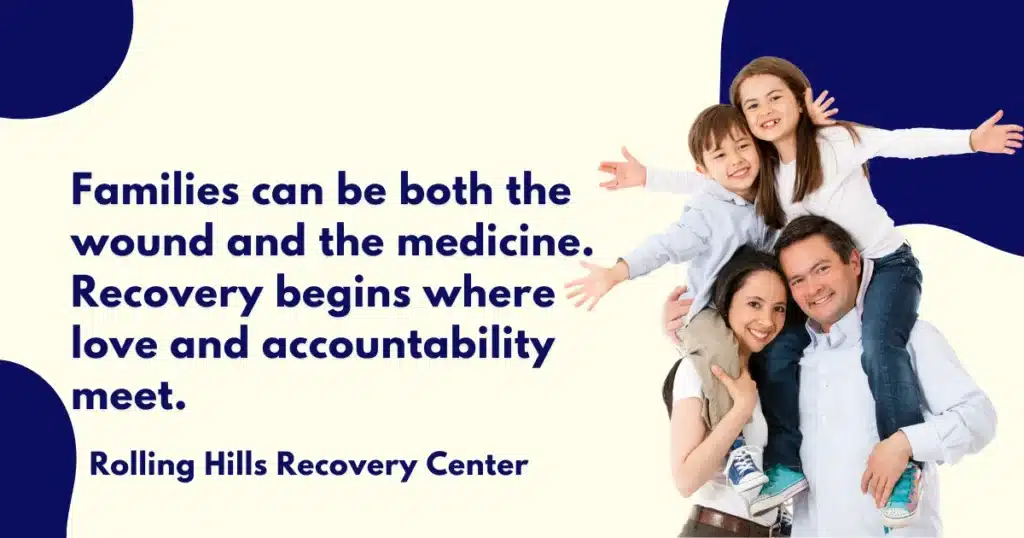
Rehab centers in New Jersey include structured family components as part of treatment. At Rolling Hills Recovery Center, our Family Therapy for Addiction Treatment includes:
- Counseling sessions with licensed therapists
- Psycho-education workshops about addiction and relapse
- Relapse prevention planning tailored for the whole household
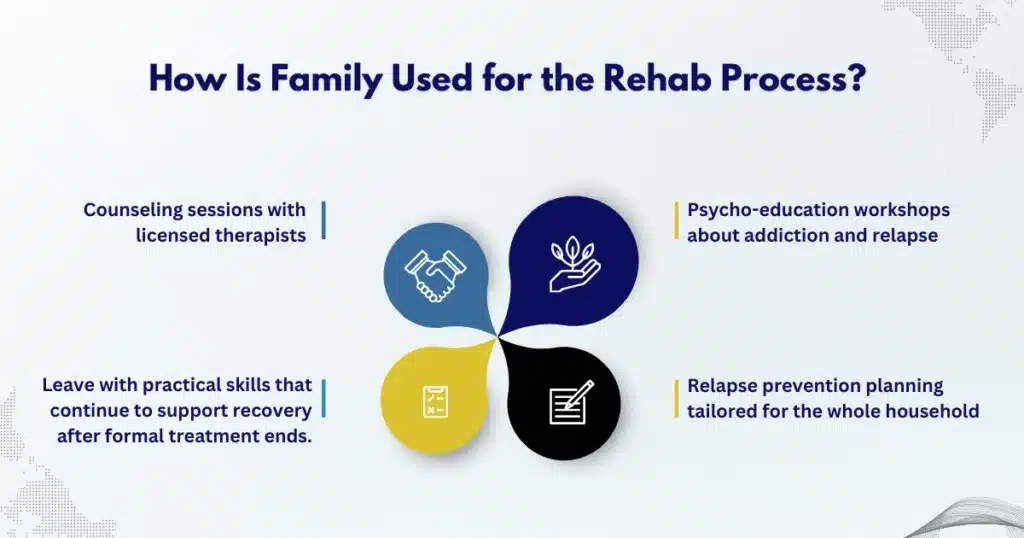
Everyone in the orbit of addiction carries something. For the person using, it might be shame from choices made, guilt over broken trust, or frustration at failed attempts to change. For partners, children, siblings, or friends, it may be exhaustion from constant tension, resentment from repeated disappointments, or fear of what might come next. Over time, communication falters, intimacy fades, and roles within the relationship shift in ways that leave everyone feeling affected.
In treatment, those patterns are finally named, understood, and changed. It’s not about assigning blame; it’s about creating space to reset. In a healthy relationship, there’s room for honesty and communication without explosions.
In clinical guided therapy sessions at RHRC, clients learn new ways to speak, listen, and respond, allowing relationships to move forward instead of circling the same arguments. Holistic addiction treatment programs treat the whole person, not just the dependence on substances; it’s about breaking cycles that have drained individuals and families alike, sometimes without anyone realizing how deep the impact runs.
Community and National Resources for Families
Families in New Jersey have access to both local and national resources:
- Al-Anon Family Groups – peer support for relatives of those facing addiction
- Nar-Anon Family Groups – for families of individuals with substance use disorders
- Mental Health Association in NJ – advocacy and support services statewide
- NJ 211 Local Resources – connects families to counseling, housing, and mental health help
- SAMHSA Treatment Locator – federal resource for rehab and recovery programs
Examples of Family Support in Recovery
Across New Jersey, families are proving that engagement works
- In Morris County, parents reported better communication after attending family therapy.
- In Bridgewater, a spouse in a support group built confidence and resilience.
- In Chester, just down the road from Morristown, siblings reconnected by joining alumni recovery events. The Rolling Hills Alumni Program keeps families connected long after formal treatment ends, ensuring recovery continues at home.
- To better understand how family participation helps, here’s a breakdown of common challenges and how NJ rehab programs address them:
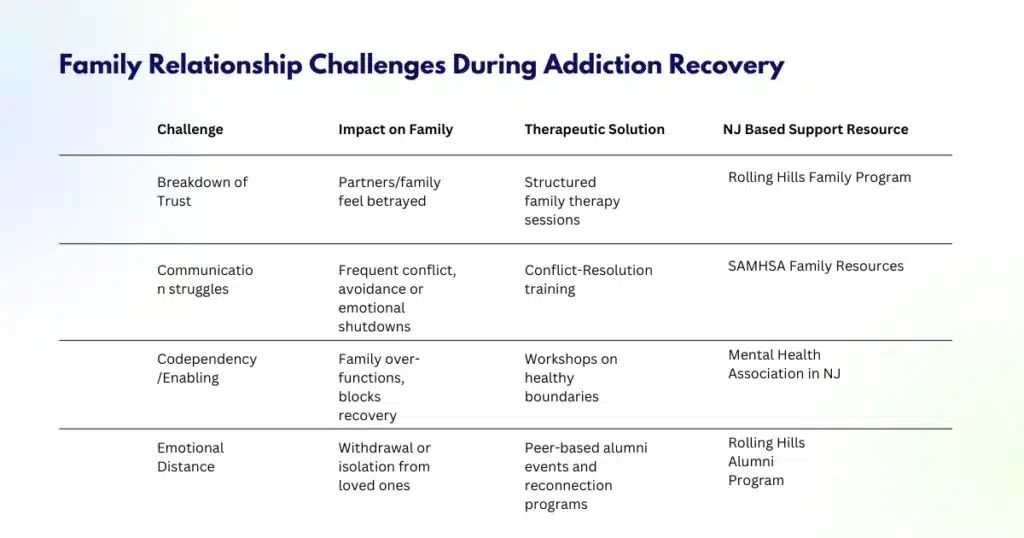
Family Therapy is the foundation for better relationships and communication, and that’s why it’s part of holistic addiction treatment at Rolling Hills Recovery Center.
Recovery is a Family Affair
Healing from addiction is about more than stopping substance use. It’s about rebuilding relationships, restoring trust, and creating an environment where recovery can last. At Rolling Hills Recovery Center, our licensed clinicians use approaches like Cognitive Behavioral Therapy (CBT) and Dialectical Behavior Therapy (DBT) to guide families toward healthier communication.
Take the Next Step
If your family is navigating the challenges of addiction, you don’t have to face it alone. Rolling Hills Recovery Center offers expert-led, compassionate programs that help both individuals and families build a foundation for long-term success.
Located near Chester, NJ, serving Morris, Somerset, Hunterdon, and surrounding counties. Call (973) 606-9170 today to begin your family’s recovery journey. Contact us to learn more about the admissions process and get started with recovery today.
Common Myths About Family Therapy in Addiction Recovery
Myth 1: Family therapy is only for spouses and parents.
Fact: Siblings, grandparents, and even close friends can play critical roles in recovery support.
Myth 2: Family therapy is just about fixing relationships.
Fact: It also teaches coping skills, boundary setting, and relapse prevention tools.
Myth 3: If the person in treatment relapses, family therapy “failed.”
Fact: Relapse is part of many recovery journeys. Family involvement helps reduce relapse frequency and severity.
Myth 4: Family members need to be “perfect” to participate.
Fact: All families bring challenges. The goal is not perfection but progress and healthier dynamics.
Frequently Asked Questions (FAQs)
How does family involvement improve rehab outcomes?
Family involvement provides accountability, strengthens communication, and creates a stable environment that reduces relapse risk.
Are families included in therapy sessions?
Yes. Many NJ rehab programs, including Rolling Hills, offer family counseling and workshops to encourage active participation.
What support groups are available for families in NJ?
Families can access Al-Anon, Nar-Anon, and programs through the Mental Health Association of NJ. National resources like SAMHSA also connect families to treatment providers.
Does Rolling Hills offer virtual family counseling?
Yes. We provide flexible options for families across New Jersey, including virtual sessions for those who cannot attend in person.
How long does family therapy last in rehab?
Sessions typically occur weekly during treatment and may continue post-treatment through alumni programs. Duration depends on each family’s needs.
Can family members join virtually?
Yes. Rolling Hills and many New Jersey rehab centers offer virtual participation to include out-of-town relatives.
What if my loved one doesn’t want family involved?
Therapists use motivational and patient-centered approaches to explore barriers and gradually invite family involvement.
Does insurance cover family therapy in rehab?
Many plans in New Jersey cover family counseling as part of substance use treatment. It’s best to verify with your provider and the facility.
Family Resource Center: https://drugfree.org/family-resource-center/
Author
-
Our editorial team includes licensed clinicians and board-certified addiction specialists. Every article is written and reviewed to be clear, accurate, and rooted in real treatment experience.
View all posts -
Dr. Williams has held senior leadership positions in the behavioral health field for over 30 years. He has worked with diverse populations in various private and public sectors.
View all posts


